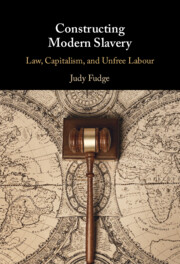Constructing Modern Slavery
Modern slavery laws are a response to global capitalism, which undermines the distinction between free and unfree labour and poses intense challenges to state sovereignty. Instead of being a solution, Constructing Modern Slavery argues that modern slavery laws divert attention from the underlying structures and processes that generate exploitation. Focusing on unfree labour associated with international immigration and global supply chains, it provides a novel sociolegal genealogy of the concept of ‘modern slavery’ through a series of linked case studies of influential actors associated with key legal instruments: the United Nations, the United States, the International Labour Organization, the European Union, the United Kingdom, and Walk Free Foundation. Constructing Modern Slavery demonstrates that despite the best efforts of academics, advocates, and policymakers to develop a truly multifaceted approach to modern slavery, it is difficult to uncouple antislavery initiatives from the conservative moral and economic agendas with which they are aligned. This title is also available as Open Access on Cambridge Core.
Judy Fudge is Professor in the School of Labour Studies at McMaster University and a Fellow of the Royal Society of Canada. She takes a sociolegal approach to studying work and labour and has published extensively on employment and labour law from a range of critical perspectives.

